Day jobs for writers and how to find them
Lessons from a moonlighter
A few months ago, I wrote something shaggy and a little manic about balancing two careers: one in tech and one in writing. I’ve always had a day job outside of editorial so this is sort of the only way I know how to do things. The only full-time job I’ve had in media was “running” BBC Music in the US for, like, 3 months with my friend Ethan Holben before COVID happened and the foundational advertising revenue we were planning for got nuked.
You're going to be tired either way
I’m writing this in the 20-minute blocks I have to spare between meetings at my day job with an advertising and marketing firm. I run a team of about 20 writers — mostly ex-journalists — who do an exceptional job of turning rough briefs from big companies into stuff that actually makes sense. I’ve been doing some form of this for the last decade. In-hou…
This post is something a little different. Several of my meaningful friendships have started based on something like mutual exchange of expertise. They were curious about how I made money as a commercial writer and I wanted to become a better essayist and journalist.
1 coached me through magazine pitches; I taught him how to use LinkedIn (lol). Basically, I get a lot of people asking me “how I do it” which, I’m realizing, is roughly convertible to “how can I also do it?” With that in mind, I’m going to spend the next couple thousand words laying that out and admitting some hard truths about the way I’ve done things. I’m not going to paywall this post because I think advice like this should be free, but if you find some value in this post, I’d love it if you’d become a paid subscriber. Let’s begin.A very short career history (honestly, skip this part if you don’t care but I promise all the stuff in this section is sort of the base layer for the actual advice)
The first 6 or 7 years out of college, I worked as a city planner for the Feds, the city of New York, Deutsche Bahn, and Google2. I loved that industry, and urbanism and transit planning are still conversation topics I get totally overexcited about. I had always harbored dreams of being a writer, but I also needed to support myself and I didn’t see a world where those things matched up with one another. I wrote for city planning sites sometimes and had an urbanism blog called Radials that is now owned by an online Thai casino. There’s a lot of foggy details here, but at some point in 2013 or 2014 my friend Cam, who worked at Billboard, had run into a fire drill where he needed a writer for a branded content piece and hit me up. I wrote quickly and cleanly and they came back to me for a few pieces here and there.
Some of you who have been around the block long enough know those were the halcyon days of sponcon, where people were getting paid $3/word for stuff that was so cheaply inoffensive you could churn the pieces out in a few hours. I parlayed that steady work with Billboard into working with other content studios at publishers: Vox, Rolling Stone, Axios (lol). The work was steady, but I knew that I was still downstream of where the real money was which was working with brands and companies directly. So I started cold emailing people at different companies, and even, in what was almost definitely a breach of protocol or solicitation agreements, reaching out to the brands that were footing the bills for branded projects I was working on and asking if they needed any help with their native content projects.
I’ve really only been full-time freelance twice in my career: for about a year after I got fired from my last city planning job in the private sector in 2017 and then for about a year in between stints at tech companies in 2023 and 2024. Even during both those stretchesI worked permalance gigs for several months at a time. All that is to say, in the last four years I’ve been able to write 60 NYT articles, a couple New Yorker pieces, a few NYT Mag essays, and a handful of things for the Atlantic, the Nation, and GQ all while working demanding 9-5 jobs. It is exhausting but its also given me the financial stability to pursue writing without the considerable pressure of living on freelance income alone. It is not for everyone, but if you’re wondering how to find a non-journalism job that will let you freelance and, crucially, appreciate your skills as a writer, I want to share some of what has worked for me.
Use LinkedIn (I know, but trust me it’s worth the pain)
I think I’ve been a LinkedIn premium member for, like, 7 years now and even though it might be the most expensive subscription I have, it’s the only one that’s paid for itself several times over. You get DM credits every month (they’ve become less effective but still a decent way to get in contact with folks) and it lets you search with a lot more granular detail than a vanilla account. Depending on your years of experience, the job listings you want to look for are things like:
Editorial director
Content strategist
Thought leadership
Narrative
Editor (yes, really)
Content writer (more on this below)
Because the LinkedIn search is scraping the job description as well as the job title, a lot of these searches can spit out bad matches. Like here’s my first results page for “thought leadership” in the Jobs tab:
A lot of these are insights driven which, to be fair, is a part of the whole “thought leadership” thing. But insights is its whole own thing, which means you’ll want to dig around some more and comb through more of the results. Here’s one that’s about halfway down the page:
Honestly, just looking at the JD and how they’re positioning it this isn’t a bad gig. (The job link is here; I know nothing about this company.) Applying through normal channels is for suckers though; the best thing to do in this situation is to put those journalism skills to work and find out exactly who the hiring manager or recruiter is and reach out to them directly. There’s a two-step process to doing that:
Search for the team structure through LinkedIn and reach out to people directly. In this case, you’d search something like “content and thought leadership method communications” and then toggle over to the “People” tab on LinkedIn.
Find the person you want to reach out to and use RocketReach or SignalHire or whatever scraper to find someone’s email through their LinkedIn profile. (I think RR and SH give you 10 free credits/month each.)
These are the search results for that first step. I’m redacting them so as not to blow up anyone’s spots, but any of the first three people would be worth reaching out to or seeing if you have a tertiary connection with.
The second step is effective most of the time, though some people have much more of an internet footprint than others. When you find their email, send them a very brief, friendly note. It doesn’t have to be a total recap of your resume or every one of your skills and bylines. Just a “hey I saw this job I think I’d be a really good fit and I’d love to talk to you about it.” Simple, warm, friendly. No presumptions and avoid sounding too eager as it has a similar perfume to desperation in my experience.
Also: Follow up, but follow up gently. This is a totally personal POV on the topic, but nothing turns me off more quickly than someone flooding my inbox 3x in a week and acting entitled to my time. I cannot emphasize this enough: when you send these emails to prospective jobs or clients, you are effectively asking them to do you a favor, so take the same tenor as you would if you were asking someone to help you move a couch.
One last thing I is something I learned from a dear friend who worked at a buzzy New York restaurant group. Intermittently, I would hit him up to see if he could get me a reservation somewhere—but I’d always do it in this mealy mouthed, indirect way where I was trying to get him to tell me what he could. One day he stopped me and said, “Tell me what you need otherwise I can’t help you.” I think that’s an important piece of advice for networking. If you’re asking for 30 minutes of someone’s time, tell them exactly what you want to ask them about or what you’re looking for and whether that is stuff you can’t get from 30 minutes of Googling. Aimless “brain picking” conversations don’t benefit anyone in my experience3.
Ask for help
I think most people know that the way to get jobs isn’t to apply through the official portal, but rather finding people you can speak with directly about whatever gig you’re interested in. Some of that is the email strategy I outline above, but you can also be proactive about finding side doors into places by getting referred by friends and former colleagues4. Not everyone has access to the same networks unfortunately. A lot of it depends on jobs you’ve held or schools you went to or how sociable you are. But regardless of all that: ask people to help you. I think we all have a lot of shame or anxiety over asking for professional favors, but I would not be anywhere close to where I am if I didn’t ask people for introductions or if they know someone at X or Y place. (A little psychological trick here: tell people you don’t have any expectations of the favor. It loosens a little bit of the pressure.) Also, always be ready to pay it forward or pay it back.
Other job boards and job types
The only other job board I frequent with regularity is the BuiltIn network, which is mostly focused on tech companies. You can filter for Content jobs in New York (or a lot of other cities) and it’s a lot less overwhelming than LinkedIn IMO. The only thing is that their definition of “content”is pretty wide so you’ll see a lot of “brand manager” and “product marketing manager” jobs which aren’t what you’re looking for. That being said, it’s where a lot of the larger consumer brands advertise jobs so if you’re looking for a gig at, like, Hinge or Notion, it’s a good bet.
I mentioned above that “editor” and “content writer” are two searches you should include if you’re looking for something. I think in the past “content writer” has meant writing SEO chum for $25/hr, but it’s still a worthwhile search term because a lot of companies don’t understand how scarred we all are from years of looking those words next to one another. This content writer gig at a family office wealth management firm is a good example of that:
A funny set of qualifications, sure, but look at this, they’re giving you exactly who you should be trying to hit up in the JD:
Search “Bessemer trust, senior editorial director” in the “People” tab on LinkedIn. She’s literally the second person in the search results page. That’s how easy it is.
“Content strategy” has been a main source of heat for a lot of writers who are looking for either remunerative freelance contracts or full-time gigs for a long time. Its diminished slightly in the last couple years, but there are still roles out there, albeit ones that want a technical understanding of performance and UX which are whole other things.
A note on copywriting and why you shouldn’t apply to those jobs unless you can write ad copy
You might be curious about copywriting which I understand. Copywriting as a discipline is very different from the kind of stuff I’m talking about further up and I’d argue that it has little overlap with the skills you’ve built as a journalist or writer. I know very good copywriters who are awful, idk, “regular” writers and vice versa. Copywriters are doing things like writing headlines that go on billboards or the description of a new car model, so unless you’re either good at that sort of work or distinctly interested in it, I don’t usually tell people to seek out copywriting jobs nor do I typically recommend people without that specific experience for open copy gigs.
Conflicts of interest
This is where things get a little more subjective as people’s definitions of conflicts or editorial red lines will differ. I work in tech; specifically I work at an AI GTM startup called Clay5. Although it’s rare, I do sometimes write critically about the tech industry and have even written critically about AI. All of my editors know I have a day job, and if I’m working with someone new I will be direct with them so they can make the decision on whether or not they’re comfortable working with me. Am I suggesting you can work at Raytheon and freelance for Jacobin? No. But I do think there are degrees of conflicts, e.g. you shouldn’t work at Spotify and still write about music, but working at Snapchat doesn’t present the same issues. The best thing to do in these situations is to be direct and honest. It’s a lot worse if someone finds out after the fact that you work somewhere that presents an actual COI.
How to figure out if the company you’re interviewing with will let you freelance
You have two choices here:
Don’t tell them anything
Tell them your writing career is important to you and that you want to maintain it while you’re working there.
Both are honestly valid, and I’ve noticed that I’ve gone from 1 to 2 as I’ve advanced in my career. If you don’t want a company to know you’re freelancing, that is totally fine but there is both the logistical challenge of finding pockets to write in (before work, after work, during breaks) and the metaphysical weight of “being found out.”
The gap between the first and second choice there is also a sort of proxy vibes radar. In the best case, a company hiring a journalist or writer to work in content understands that they are hiring someone who, maybe, isn’t doing exactly what they want to be doing professionally. Good companies understand they are giving a writer a foundation and in exchange for that stability, they get a wordsmith. You might think that’s a naive way of looking at the world but every full-time job I’ve had has agreed to let me freelance as long as it didn’t interfere with my work. Don’t fuck up the balance and you’ll be fine.
Now about that balance…
I’ve said this I don’t know how much to people, but you have to want to write really badly in order to make all of this work. And just to put on my boomer hat for a minute, I don’t know if people quite understand what “hard work” actually entails in this scenario. I write before I go to work in the morning, I make reporting calls while I’m eating lunch, I read background material PDFs in those moments when I don’t have meetings. The first thing I do on most weekend mornings is edit something or make notes about what else a story needs. My laptop comes with me on every vacation. I have started to count the hours down from Friday evening to Monday morning because I’m impatient for my editors to reply to me. All of this is, honestly, not healthy! But I’m not going to lie to anyone and say that I’m doing this the easy way.
It also depends on your ambitions and how you value prolificness. I’ve been increasingly interested in doing fewer, bigger things which is the result of having written a ton of small things. A lot of professional decisions are responses to previous scenarios, so what you want will inevitably shift as you go.
Sigh, yes you should learn to use AI
Listen, this is going to be where I might lose some people and I understand that. But every company you interview with is going to ask you if you know how to prompt an LLM like OpenAI or Anthropic/Claude or “how you integrate AI into your workflow” 🙄. It’s annoying, but that’s where we’re at and I promise its painless and that you’ll actually probably be really good at AI because it’s mostly asking good questions and understanding story structure6. This prompting course from Google and this one from Columbia are great to learn the basics of how to use different LLMs, but a ton of your value is going to come from understanding what makes a piece of writing good or shitty. Editorial taste is a huge value add right now because, as I’ve said before, the writing that LLMs produce is boring and stale.
What if AI just makes everyone really boring?
Last week, the Princeton professor D. Graham Burnett wrote an essay for the New Yorker about his fascination with how generative AIs and LLMs are changing the way his students interact with and ingest information. The first half of the piece is interesting, a sort of interrogation of how the technology is changing behavior on campus and how students and…
I’m actually getting to the point where this post is too long to be displayed in email so I’m going to cut it off and potentially do a part II if there’s interest. If there are any questions at all, please comment below and I’ll try to respond to everyone.
Everyone congratulate Peter on being a newly inaugurated high school teacher!
I won’t go into the details so as not to bore people, but if you’re curious leave a comment and I’ll explain.
There are caveats here, especially if it’s someone just starting out who wants help and mentorship or if there’s a social connection already there.
Some departments in tech basically run on referrals; half the posts on sites like Blind are SWEs asking for referrals to companies as a sort of kickback scheme.
Even my decision to take a job at Clay was based on it being very far away from more “cultural” AI companies. Taking a job at OpenAI or Anthropic and maintaining a writing career would be bizarre.
If you’re opposed to AI for moral reasons, I completely understand.



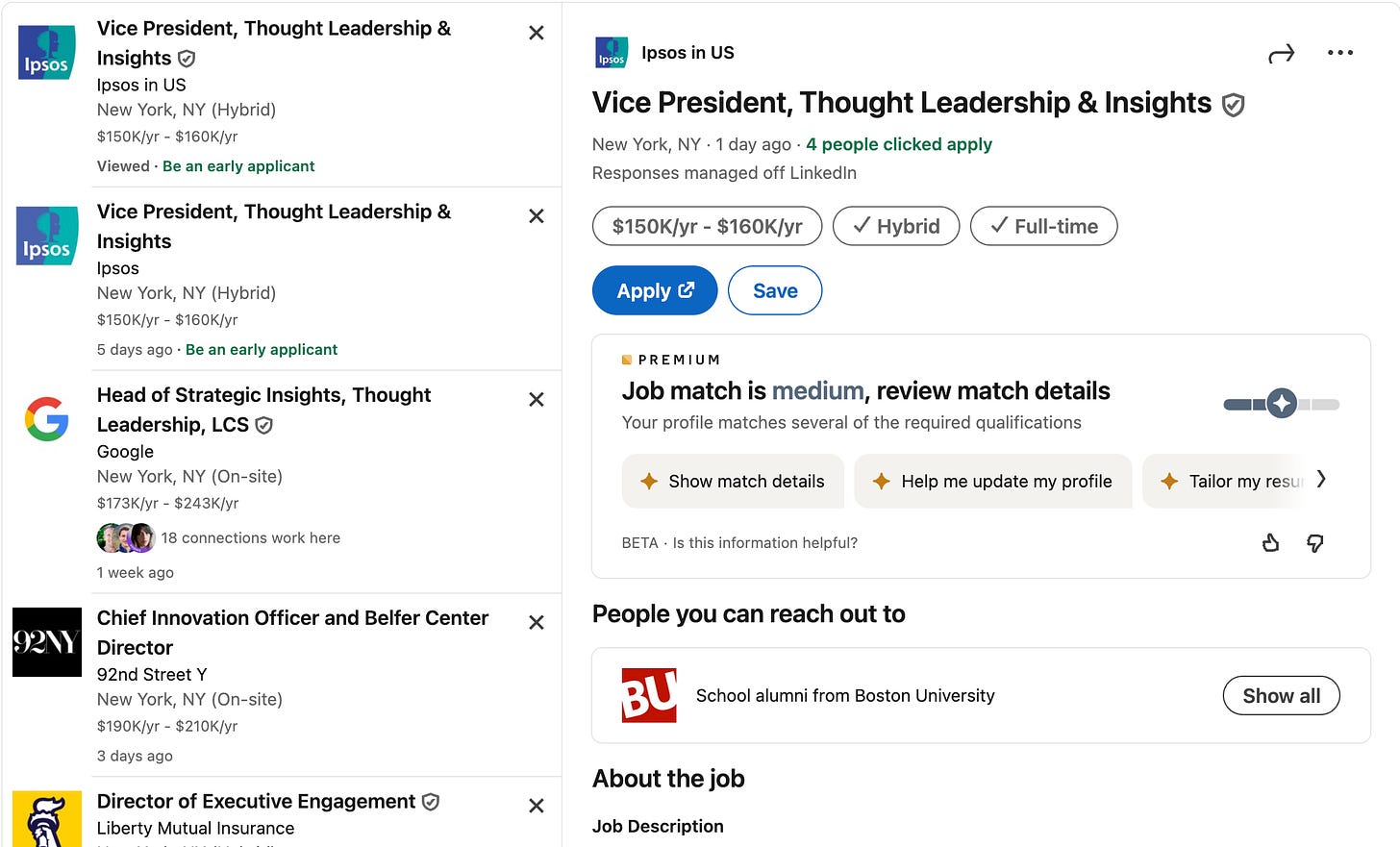
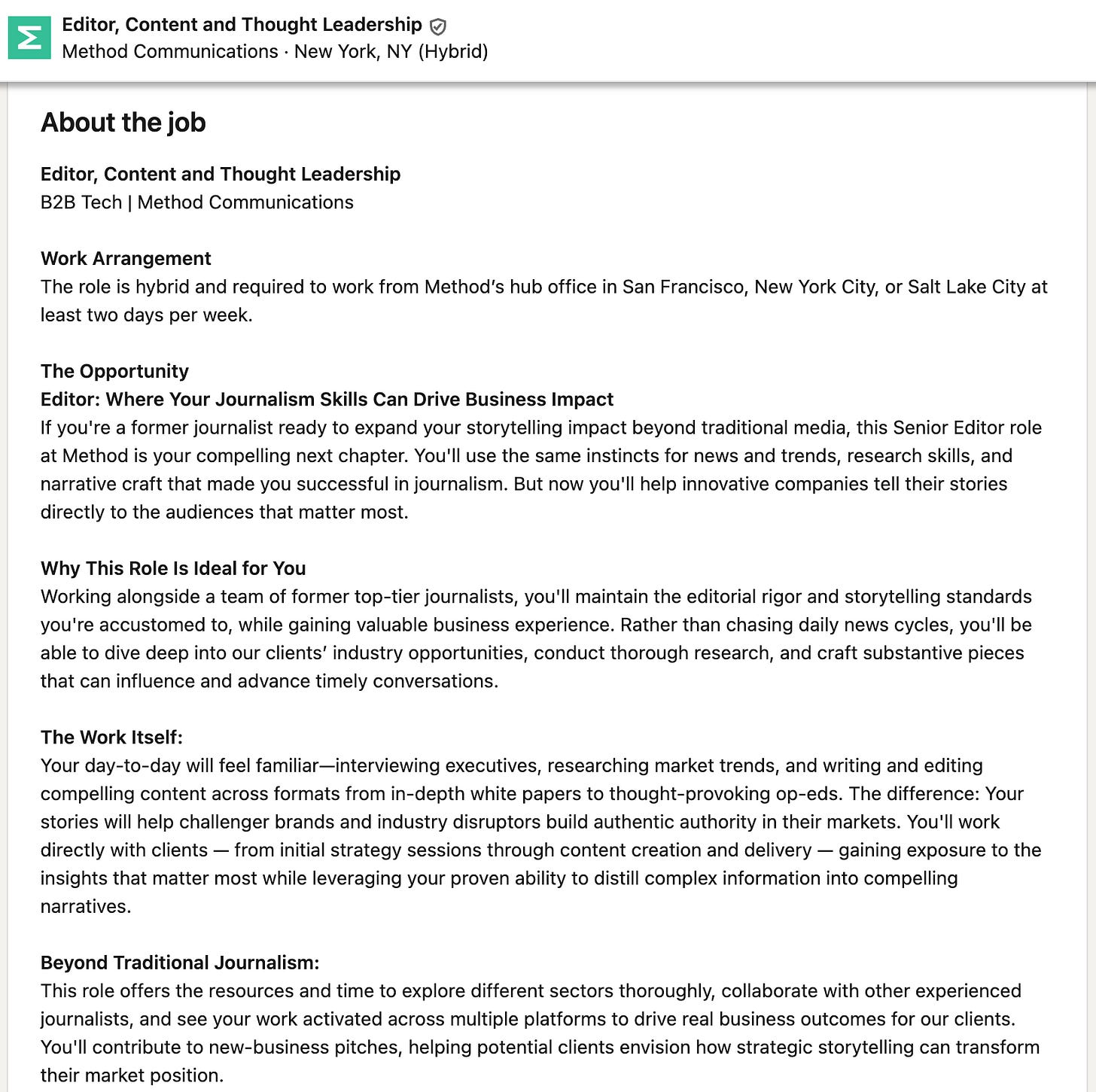
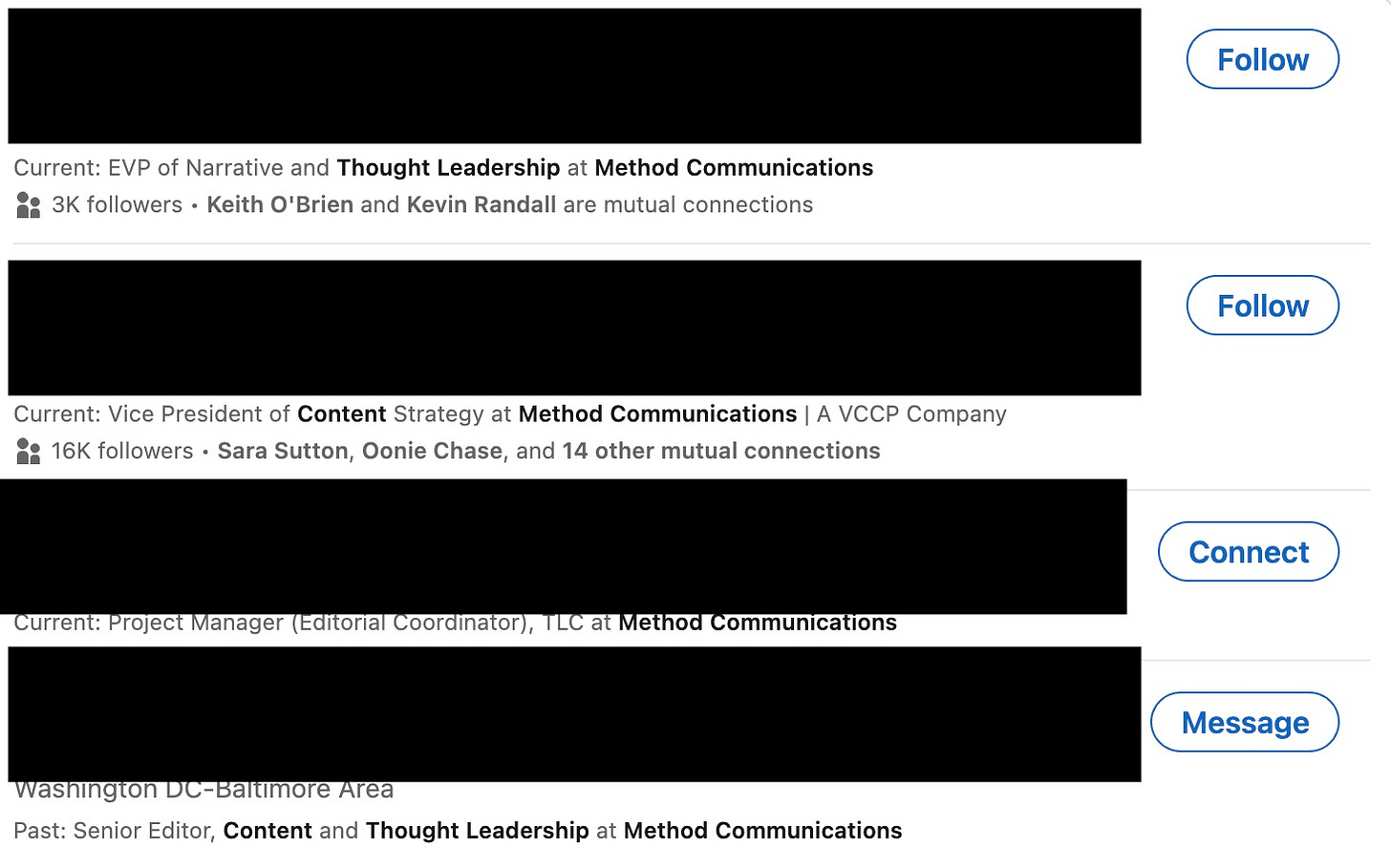
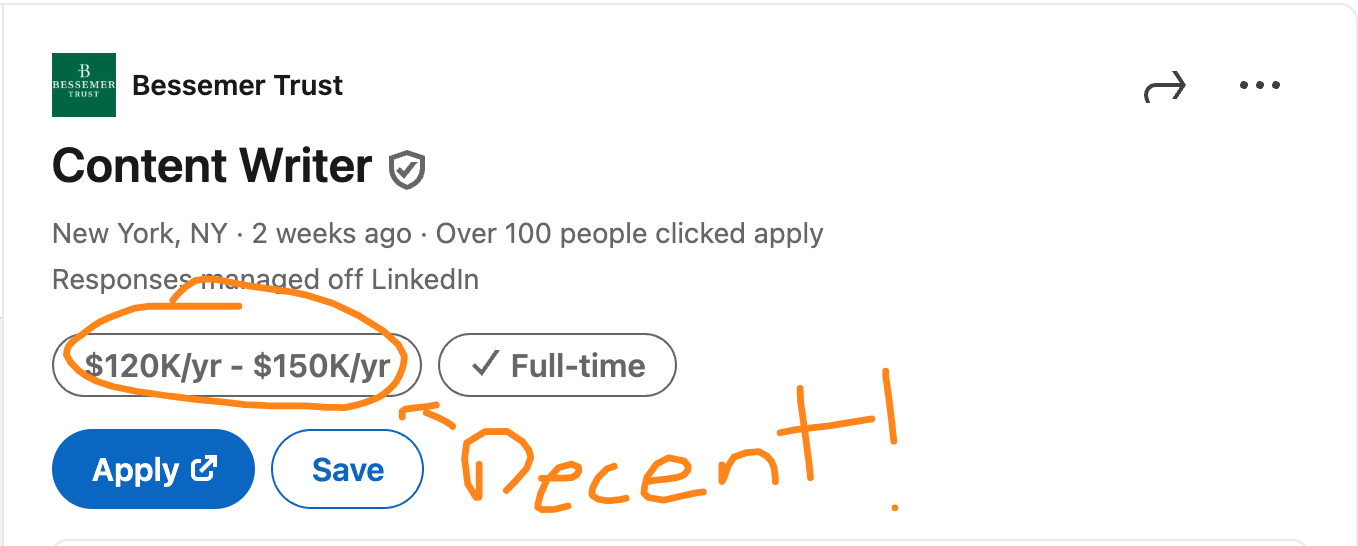
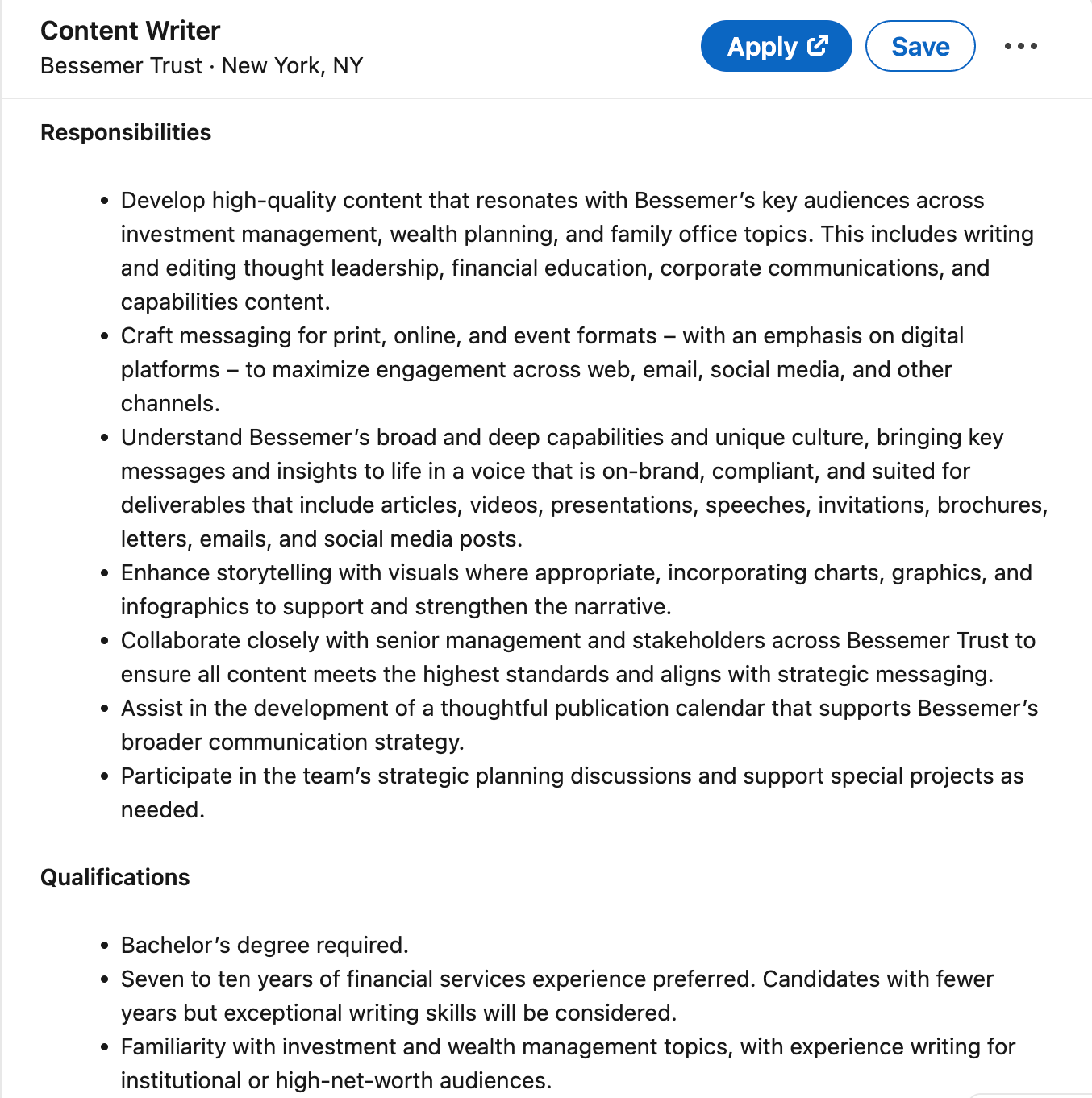
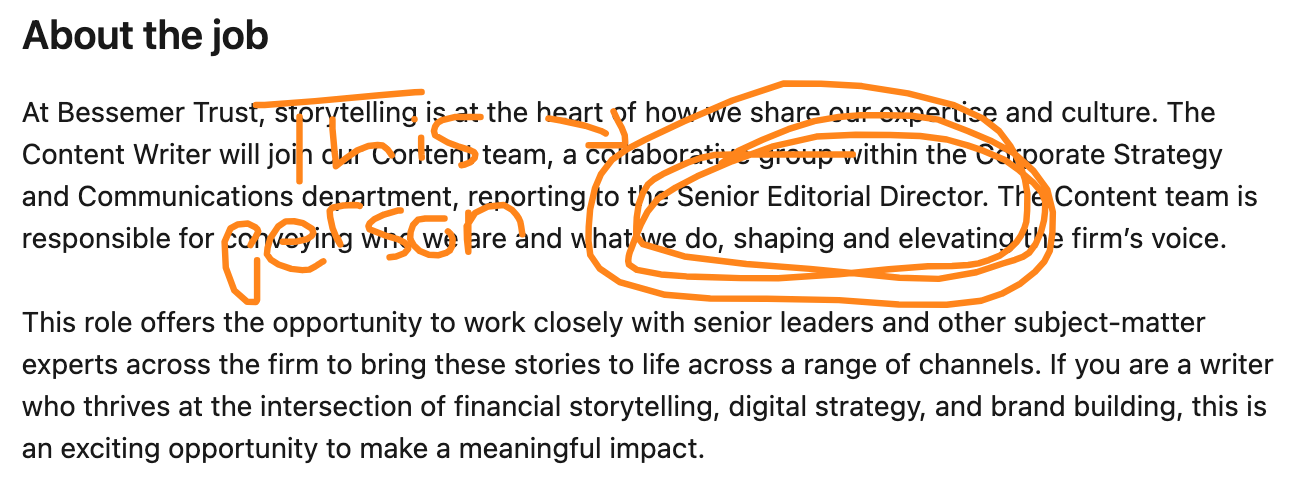
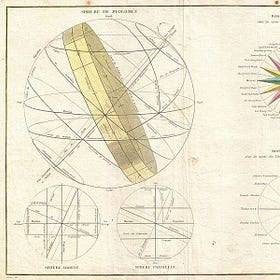
This is so great! As a fellow late starter, I've ended up being super grateful the breadth of my contacts from a decade plus in advertising has kept me booked with freelance work through my MFA and beyond while allowing me to keep writing, but the LinkedIn stuff sounds great for the day I lose patience with marketplace health insurance (could be any day now, truly). And hard agree on the copywriting thing--I went into advertising thinking I'd be a copywriter and they put me in strategy instead, and I'm so grateful I can keep those parts of my life separate.
Curious if you ever find business jargon or sales-y thinking slipping into your journalistic work--I feel like advertising gave me bad habits I've had to work hard to correct.
I loved loved loved this! I also built my freelance writing career working at a tech company so relate to this so much